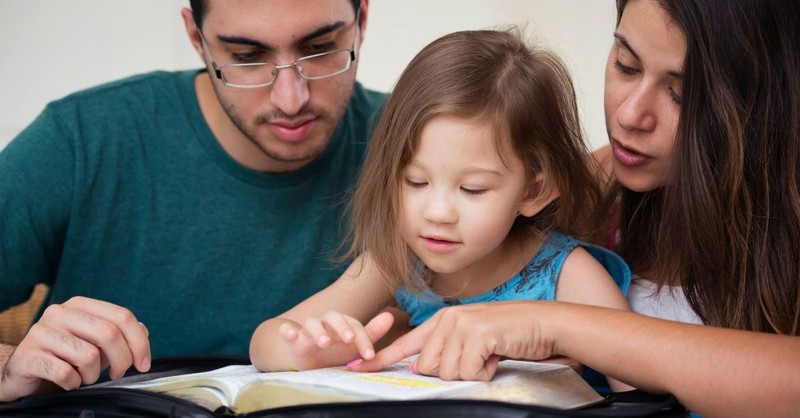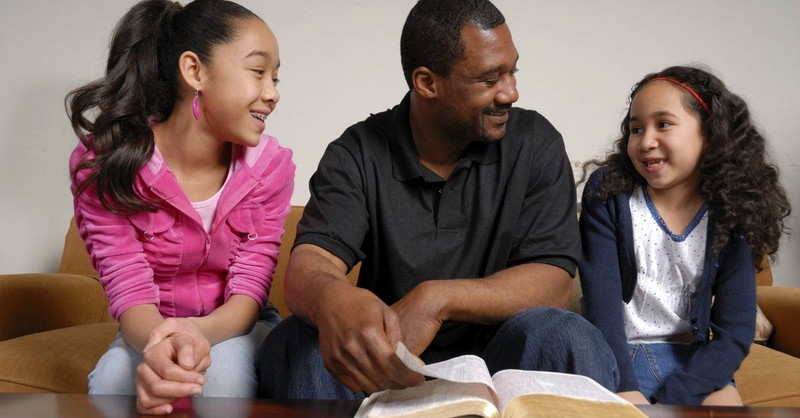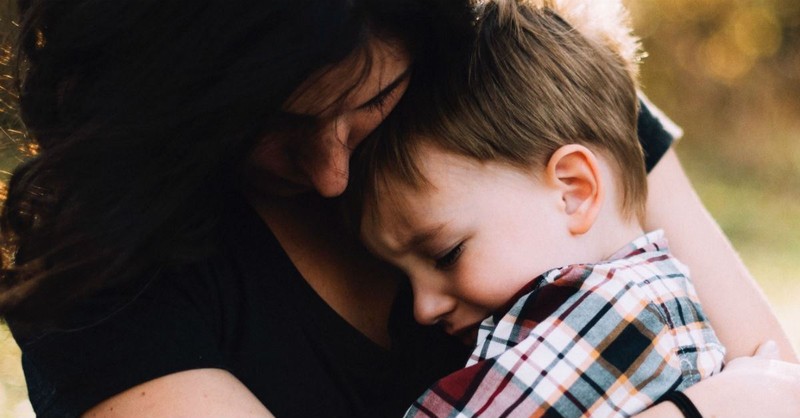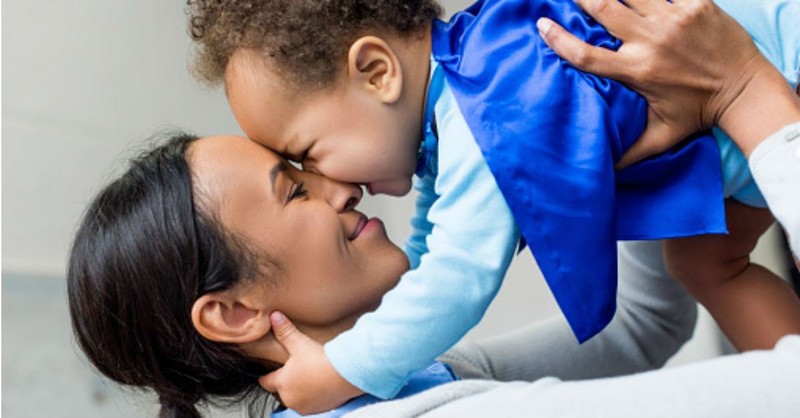
Children’s reactions to everyday situations will often clue us in to what they understand about Jesus. Talking to our children builds bridges of communication and pathways to share and talk about our faith as well as theirs. There is an opportunity to honor Christ in almost every conversation if we are aware and in tune to it. Children can be bold and honest questioners of the world as they see it, including our faith. But many can be hesitant, unsure of how to discuss the deeper faith questions or concerns when they hear no one else asking them. Here are some questions parents can ask their children to help steer everyday conversations towards Christ, and to better understand what God is doing in their lives.
Image Credit: Getty Images

1. What do you think?
Naturally curious as they are, children are full of the questions as they explore the workings of the world. Very young children ask great questions about why things are, leading to great discussions about God’s creation. Older children begin to wonder how all of the facts they have learned apply to their daily lives, wanting to understand what role they are to play in the scheme of things, and parents get a front row seat to this exploration.
As we seek to help our children make connections between faith and the worldly realities in front of them, it can be tempting to give them our own answers as the final solution. Instead of doing this, ask what they think about something, and encouraging them to make the steps necessary to grab hold of faith themselves. No parent can do this for them.
Image Credit: Thinkstock

2. Where should we go to find help with that?
Pointing our children to God is our primary job as parents. Asking them how they think a situation should be resolved, or where they can go to find help, will let us know how much they grasp Who God is. He promises to be close to the broken-hearted, He is everywhere and all-knowing.
As children grow, they will come to understand and know God on new levels. To help them connect with our ever-personal God, we as parents can keep pointing them to Him. We can pray with them, read Scripture with them, and simply talk about the practical and miraculous ways we have experience God in our own lives. He is where all our help comes from.
Image Credit: Thinkstock

3. Do you remember the story about …?
Children who grow up in church or in Christian homes hear popular Bible stories many times throughout their lives. They have watched (sometimes goofy) skits and memorized the books of the Bible, but is that all there is to it? What do they do with all of that knowledge? If we, as parents, can start to connect some of the popular stories they learn as young children to their everyday lives as they grow, we will start to see the light bulbs turn on in their faith lives.
Moses lacked confidence, something all tweens can surely relate to. Everyone thought Noah was crazy to build the ark! Many children will begin facing criticism for being different than others. Jesus was mocked on his way to the cross. Children who are bullied or picked on can find comfort in a God who can fully relate to their pain.
Image Credit: Palidachan/Thinkstock

4."Why do we forgive?"
We know that because of Jesus, we are always forgiven, and never loved less. Children may need to take their own journey to understand exactly how this is true for them. But saying these words, that "we are always forgiven, and never loved less," can serve as an important mantra in any home from early on, helping to remind children why we are quick to forgive others. Apologizing can sometimes seem impossible for children. From a young age, it’s tough for them to mouth the words “I’m sorry,” at an audible level, even though everything else they say is with an outside-voice volume.
From a young age, and as they grow older, apologies can become commonplace. From the example we set for them, they can see that it’s normal and an everyday occurrence to ask for forgiveness. No one is perfect—another important concept for them to grasp. We love them no less when they make a mistake. Knowing whether they understand the reason we forgive can reveal just how much they understand what Christ has done for us.

5. What does Jesus teach us about that?
This question tests every family rule and Sunday school lesson our children absorb. It’s interesting to see how they answer, and how those answers develop over time as they mature. When my elementary school kids see other children picked on in school, or when they themselves are picked on, they respond saying, “hurt people hurt people,” because we teach them to have compassion on those who hurt them.
Jesus had compassion on those who hurt Him, and so we, too, can leave the people who hurt us in His capable hands, choosing to stop the cycle of hurt with love. Our faith begins to stick when we are faithful to apply it in everyday life.

6. Why do you think are we here?
Do our children know they have a special purpose on this earth? Are they aware of how special they are to God? They were known by Him before they were born. Jesus held their name in His heart as He gave His life for us on the cross. When they start to realize how special they are to their Creator, their godly confidence can bloom freely.
It’s never going to be easy, helping our children grow in faith as they grow up. But through the many challenges, being grounded in who and Whose they are helps them feel loved along the way. We are put on this earth to love and serve others, and to glorify God in all we do. Both are foundational concepts to relate to our children’s everyday realities as they grow.
Image Credit: Pixabay

7. How does that make you feel?
Allowing our kids to fully feel their feelings is important. Instead of being threatened by questions we fear we may not have the answers to, or dilemmas we do not know how to solve for them, rest in the care of our Father, who is also looking out for them above and beyond us. Doubts and questions grow faith. Disappointment and failures mature us. Gaps can be filled by His presence.
All feelings aren’t scary and sad, though. In moments of jubilee and celebration, we can teach them how to glorify God and become humble in accepting praise and pointing to Christ. Emotions are important! Let children feel them and learn to take them all to God. Anger, frustration, sadness, excitement, happiness and achievement. God welcomes them all. It’s part of the process of maturity to understand how to feel and express emotions, but they are not a reliable basis for decision-making. We can get a good gauge on their faith by how much they base their actions and decisions off of their feelings.
Image Credit: Getty Images

8. What is the good you see in them?
When both of my daughters began Kindergarten, I received the full report of every classmate’s behavior on the car ride home from school. Naturally, the negative reports came out first, and the positive ones were harder for them to remember! Human nature leads us to lean in to gossip, and share a good scoop about someone’s misdeeds that sounds much worse than what we think we would ever do. Or so we believe.
Those car rides bred good conversations about how to respond to gossip, and learning to recognize the potential for goodness in everyone. There are times when serious bullying calls for intervention. But on most occasions, we have the opportunity to choose to see the good – the image of God – in others. Model this for children and hold them – and yourself – accountable to it.
Image Credit: Nicholas Githiri/Pexels

9. What if …?
Fears and anxieties are normal to a certain extent. As children grow, we should always keep an eye on anything we think a counselor or medical professional should tune in to, but for the most part, talking about fears removes most of the fear. Asking our kids, “What if that does happen?” tells us a lot about how their faith has grown to inform them about their circumstances and who is in control. Hopefully, in time, they will come to know undoubtedly that God is God no matter what. That He is good, and makes good of all things, even the things we will never understand. When we acknowledge childrens' fears and talk them through, it lets them know it is OK – very normal, in fact – to ask questions and have fears.
Image Credit: Unsplash

10. Who loves you?
When my girls were little, I would ask this question, and it was music to my ears to hear their tiny voices reply, “Mommy does!” Oh, sweet victory, but it was also a wonderful opportunity to start pointing them towards the One who loves them even more than I do. Kids have lots of questions, and knowing God loves them even more than we do takes the sting of fear out of the great big, unknown world. As their mom, I love my girls for who they are, right now. I always have. Loving them unconditionally – even when it’s tempting to push them towards goals and accomplishments– allows them to experience unconditional love. Eventually, because we point to Him as the source of our love, they will come to know the same love from their heavenly Father.
“Because I love you” should always be the answer to their “why’s.” We exist because God loves us, and everything He does for us is out of His love. Love really does always win, and it is the most important element of our faith. Jesus died out of love for us, to forgive us. Love has already conquered all.
“Megs” writes about everyday life within the love of Christ. She stepped out of her comfort zone, and her Marketing career, to obey God’s call to stay home and be “Mom” in 2011. From that step of obedience her blog, Sunny&80, was born, a way to retain the funny everyday moments of motherhood. Meg is also a freelance writer and author of “Friends with Everyone.” She loves leading her Monday morning Bible study, being a dance mom, distance running and photography. Meg resides in Northern Ohio with her husband, two daughters, and Golden-Doodle … all avid Cleveland Browns fans.
Image Credit: LightFieldStudios/Thinkstock
Originally published Thursday, 21 March 2019.








